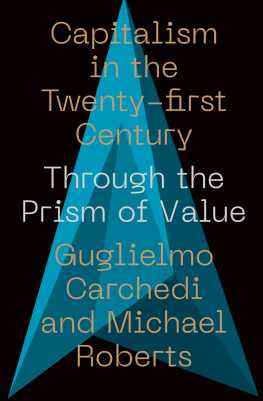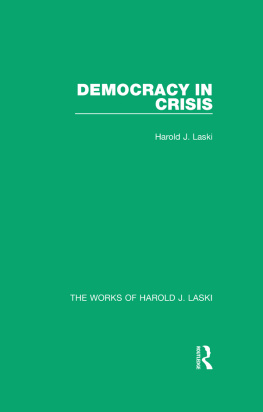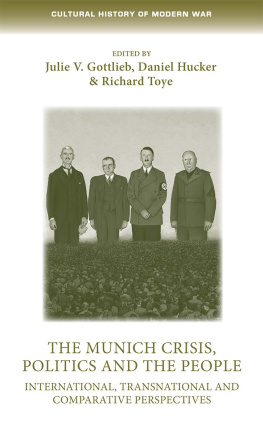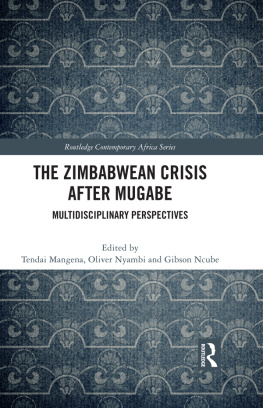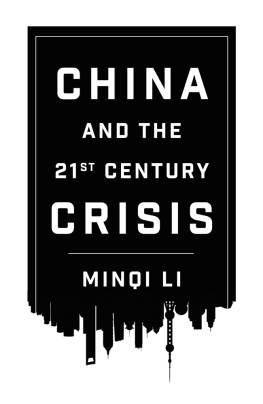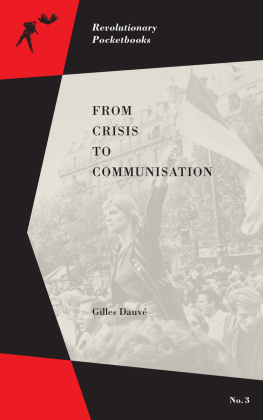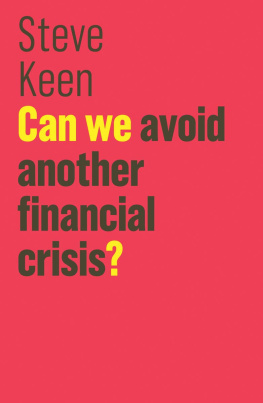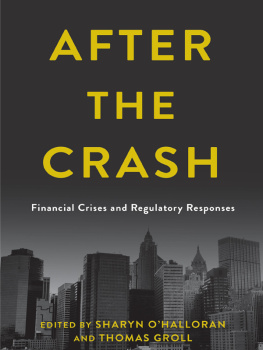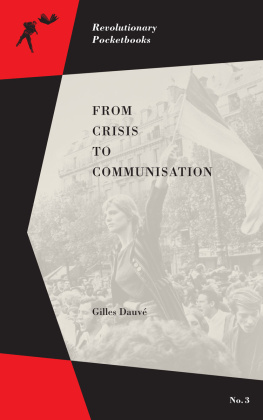Carchedi Guglielmo - World in crisis: Marxist perspectives on crash & crisis
Here you can read online Carchedi Guglielmo - World in crisis: Marxist perspectives on crash & crisis full text of the book (entire story) in english for free. Download pdf and epub, get meaning, cover and reviews about this ebook. City: Chicago, year: 2018, publisher: Lightning Source Inc. (Tier 3);Haymarket Books, genre: Politics. Description of the work, (preface) as well as reviews are available. Best literature library LitArk.com created for fans of good reading and offers a wide selection of genres:
Romance novel
Science fiction
Adventure
Detective
Science
History
Home and family
Prose
Art
Politics
Computer
Non-fiction
Religion
Business
Children
Humor
Choose a favorite category and find really read worthwhile books. Enjoy immersion in the world of imagination, feel the emotions of the characters or learn something new for yourself, make an fascinating discovery.
- Book:World in crisis: Marxist perspectives on crash & crisis
- Author:
- Publisher:Lightning Source Inc. (Tier 3);Haymarket Books
- Genre:
- Year:2018
- City:Chicago
- Rating:3 / 5
- Favourites:Add to favourites
- Your mark:
- 60
- 1
- 2
- 3
- 4
- 5
World in crisis: Marxist perspectives on crash & crisis: summary, description and annotation
We offer to read an annotation, description, summary or preface (depends on what the author of the book "World in crisis: Marxist perspectives on crash & crisis" wrote himself). If you haven't found the necessary information about the book — write in the comments, we will try to find it.
World in crisis: Marxist perspectives on crash & crisis — read online for free the complete book (whole text) full work
Below is the text of the book, divided by pages. System saving the place of the last page read, allows you to conveniently read the book "World in crisis: Marxist perspectives on crash & crisis" online for free, without having to search again every time where you left off. Put a bookmark, and you can go to the page where you finished reading at any time.
Font size:
Interval:
Bookmark:
WORLD IN CRISIS
WORLD IN CRISIS
A GLOBAL ANALYSIS OF MARXS LAW OF PROFITABILITY
EDITED BY GUGLIELMO CARCHEDI AND MICHAEL ROBERTS

2018 Guglielmo Carchedi and Michael Roberts
Published in 2018 by
Haymarket Books
P.O. Box 180165
Chicago, IL 60618
773-583-7884
www.haymarketbooks.org
ISBN: 978-1-60846-188-2
Trade distribution:
In the US, Consortium Book Sales and Distribution, www.cbsd.com
In Canada, Publishers Group Canada, www.pgcbooks.ca
In the UK, Turnaround Publisher Services, www.turnaround-uk.com
All other countries, Ingram Publisher Services International,
This book was published with the generous support of Lannan Foundation and Wallace Action Fund.
Library of Congress Cataloging-in-Publication data is available.

PREFACE
World in Crisis has a specific aim: to provide empirical validity to the hypothesis that the cause of recurring and regular economic crises or slumps in output, investment, and employment in modern economies can be found in Marxs law of the tendential fall in the rate of profit. Marx believed, and we agree, that this is the most important law in political economy.
The law is either ignored or disputed by mainstream economics, for an obvious reason: it suggests a fundamental flaw in the capitalist mode of production. Mainstream economics (whether neoclassical or Keynesian) starts from the assumption that capitalism is the best and, indeed, the only possible mode of productionthat it can be improved but should be retained. The proposition that Marxs law provides the ultimate explanation of recurrent crises under capitalism is also denied by heterodox and many Marxist economists. They look to other explanations of crises. Much of the debate concerns what Marx actually wrote about crises in his works and what he meant. That debate continues. But far too often, alternative theories of underconsumption, rising inequality of income and wealth, surplus capital and overproduction disregard the laws empirical evidence.
This is where this book comes in. The book collates empirical work, mainly that of young Marxist scholars, from around the world (the Americas, Europe, and Asia) that supports the validity of Marxs law of profitability as a theory of crises and, in particular, of the recent Great Recession.
This empirical analysis has political consequences. The law reveals that crises arise from the very essence of capitalismthe fundamental contradiction inherent in technological progress, the motor of capitalisms developmentnamely, that technological progress, while increasing labor productivity, at the same time replaces labor with the means of production, thus decreasing the value of the greater output. If less value and surplus value is generated, less value and surplus value can be realized. This is the root cause of falling profitability and crises. It reveals itself as an ever-changing, complex articulation of the tendency and changing countertendencies, which give each crisis its own specific features. But the underlying cause is the same. Marxs law implies the unpalatable truth that capitalist crises cannot be permanently ended without ending the capitalist mode of production itself.
This book is academic in format: it is often dense in analysis, and it is flush with figures and numbers. This is a necessary drawback. Nevertheless, we believe that the proof of the pudding is in the eating; a theory, to be credible and useful, should rest on sound empirical evidence. And we believe that the evidence submitted in this volume is very robust indeed. As the old saying goes, sapiens nihil affirmat quod non probat: a wise man states as true nothing that he does not prove.
INTRODUCTION
World in Crisis is a collection of recent papers by Marxist economists from around the globe. Its purpose is simple. It is to compile evidence from recent developments in economies internationally to support the view that Marxs law of the tendency of the rate of profit to fall provides the best explanation of the cause of recurrent and regular crises (slumps) in global capitalism.
The authors of the papers we have included and commissioned start from that premise and, in our view, justify it through the evidence they generate from various economies. It is a controversial conclusion, denied not only by mainstream economicswhich studiously ignores the Marxist narrative on crisesbut also by heterodox strands in macroeconomicswhich look to the theories of Keynes, Minsky, Kalecki, and others who deny the role of Marxs law in crises and instead rely on theories based on underconsumption, overproduction, financialization, excessive debt, or inequality of income and wealth. Indeed, even many economists who consider themselves Marxists consider that Marxs law of the tendential fall of the rate of profit has only a limited relevance to recurrent crises, and especially to the last major slump in capitalist production between 2008 and 2009, now called the Great Recession.
Several important Marxist economic works have established that Marxs theory of value and the concomitant law of the tendency of the rate of profit to fall are based on realistic assumptions and are logically consistent as a possible explanation for the movements in capitalist investment and economic output. This book aims to go a step further by presenting evidence that Marxs law best fits the facts, as well.
Some Marxists reckon that trying to present quantifiable empirical evidence to support Marxs law is both impossible and unnecessary. For them, using the data provided by national and international statistical agencies will not provide any sort of close approximation to Marxist value categories or the Marxian rate of profit. And anyway, they say, the best proof is not statistical data but the very existence of recurrent and regular economic crises. We disagree.
The scientific method requires the analysis of data against categories to test any theory or law and, if necessary, to falsify it. Indeed, both Marx and his collaborator, Engels, tried to do just that by compiling data to support theory and using empirical analysis to develop theory further. In particular, when Marx developed his law of the tendency of the rate of profit to fall, he reckoned that a falling rate of profit was self-evident in the early nineteenth century, as the classical economists also assumed. But it was necessary to explain why the rate of profit fell, why it did not always fall, and what the implications of a tendency to fall meant for the capitalist mode of production and its ultimately transitional nature.
Without such analysis, science (and economics) cannot progress to a better understanding of social processes, nor, in the case of Marxism, know through what stage capitalism is passing and how the forces struggling for a new society, labor, should act accordingly to change the world.
We set several criteria in deciding which papers to include in this book. The first was that each had to make an empirical contribution to explaining and supporting Marxs law. Theoretical arguments were not enough.
Second, we required that the papers specifically deal with the Great Recession and its cause. While there are many excellent papers that we could have included that support Marxs law empirically, we wanted ones written after the end of the Great Recession. After all, there is nothing better than the benefit of hindsight!
Next pageFont size:
Interval:
Bookmark:
Similar books «World in crisis: Marxist perspectives on crash & crisis»
Look at similar books to World in crisis: Marxist perspectives on crash & crisis. We have selected literature similar in name and meaning in the hope of providing readers with more options to find new, interesting, not yet read works.
Discussion, reviews of the book World in crisis: Marxist perspectives on crash & crisis and just readers' own opinions. Leave your comments, write what you think about the work, its meaning or the main characters. Specify what exactly you liked and what you didn't like, and why you think so.


